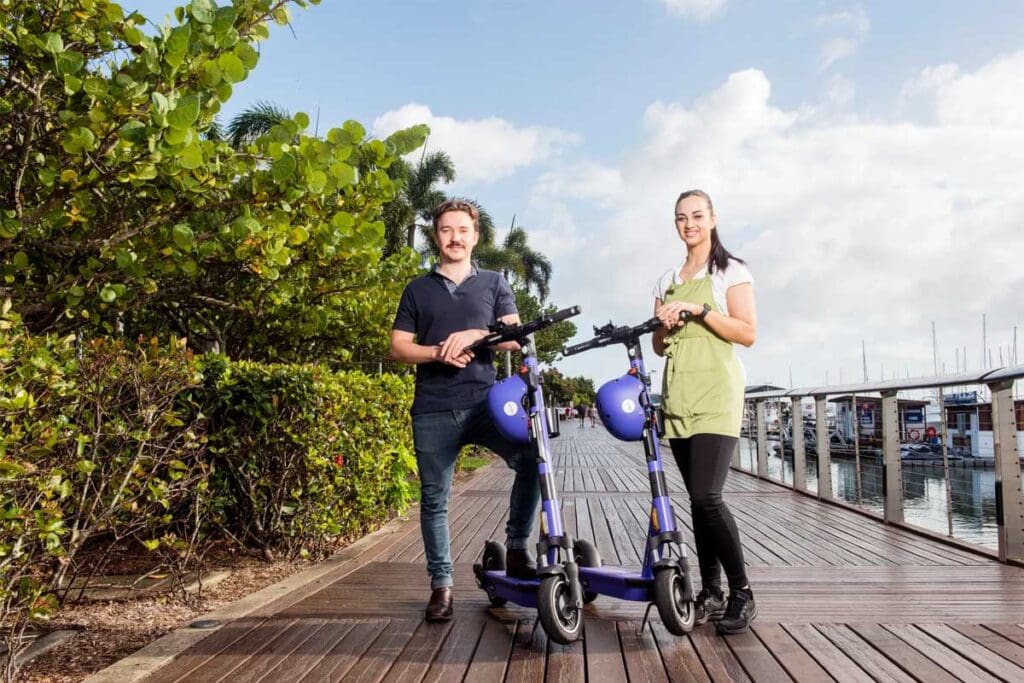Beam Doubles Fleet in Cairns

Cairns, Queensland
Beam added another 200 e-scooters to its share service in Cairns last week, doubling its fleet in the Far North Queensland city, after activating 10 more parking hubs during the past three months.
The company now partners with more than 30 businesses throughout Cairns, with e-scooters parked at partner business locations using fixed ‘virtual docking’ technology that requires riders to end their trip at locations identified within the Beam app.
Over 60,000 kilometres have been travelled by Cairns riders since Beam introduced share services in the city three months ago, with Beam data revealing riders travel twice as long in Cairns as they do elsewhere in Australia.
The national average for trips on Beam scooters is 10 minutes, but riders in Cairns are travelling for an average of 20 minutes.
Leisure travellers comprise 65% of Beam riders in Cairns and it says rider research by the company has shown micromobility’s potential to enhance the visitor experience in Cairns:
- 81% of riders said having access to a Beam Parking Hub at their hotel would influence their decision to stay there in the future
- 86% of riders identifying as visitors to the city said having access to Beam scooters enhanced their experience of Cairns
- 76% of riders identifying as visitors to the city said having access to Beam’s e-scooters in Cairns increased their interest in travelling to areas or destinations that they ordinarily would not have visited.
The company also expanded into the northern WA town of Broome this week, days after the Broome council approved a trading permit for a 12-month trial.
Beam has introduced 300 e-scooters to the town, a few days after announcing it is also launching a service in another WA centre, the City of Kalgoorlie-Boulder.
It is the first e-scooter share services for both centres.
Neuron Services Aid People with Disability
Recent research by another e-scooter share service provider, Neuron Mobility, shows five percent of its e-scooter riders reported having a disability or mobility impairment.
“The number may seem relatively small, but it represents a significant portion of Australia’s rental e-scooter riders and it underscores the importance of ensuring that these modes of transportation are accessible to all,” the company says.
“The findings provide a new perspective as e-scooters are often described negatively in the context of the disability and mobility-impaired community.
“Many respondents said their disability or mobility impairment made it difficult for them to walk long distances or for extended periods of time. They cited issues ranging from temporary injuries to chronic back, leg or joint pain and conditions like hip dysplasia, scoliosis, fibromyalgia, multiple sclerosis and asthma.”
Neuron says the research, which included surveys and interviews, highlighted that many riders with disabilities or mobility impairments reported rental e-scooters significantly improved their urban accessibility, helping them make trips they would not otherwise have made (18%), while also allowing them to run errands and connect to public transport more easily.
“When looking at how riders with a disability or mobility impairment use Neuron e-scooters, the research found that trips were more purposeful and productive than the national average for all e-scooter riders in Australia.
“Reasons included commuting (39% vs 33%), running errands (37% vs 29.5%), going to appointments (26% vs 21.5%), and connecting to public transport (24.5% vs 22%).”
